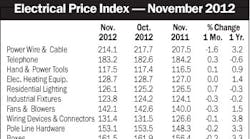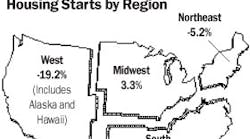Following a surge into growth territory in November, NEMA’s Electroindustry Business Confidence Index (EBCI) for current North American conditions slipped from 52.2 points to 47.8 points in December. This suggests a modest reversal in business conditions from November, when the EBCI, a monthly survey of electrical manufacturers published by the National Electrical Manufacturers Association (NEMA), Rosslyn, Va., had signaled the first month-to-month improvement since April.
The EBCI indexes measure the sentiment across the electrical manufacturing industry, with a reading above 50 indicating conditions favorable for industry expansion. A companion measure, the mean degree of change in North American business conditions was flat — registering a 0 on a scale ranging from –5 (deteriorated significantly) through 0 (stayed the same) to +5 (improved significantly) — for a second straight month, implying a largely flat business environment since October.
The EBCI future conditions index for North America was only slightly better. Though the value of the index increased in December to 45.7 points from 37 points in November, that reading nonetheless amounts to a forecast of continued modest deterioration in business conditions over the first half of 2008. December was the fourth consecutive month in which the EBCI future conditions index for North America registered below 50 points.
The mixed reading in this month’s EBCI survey is in line with the mixed signals sent by the construction, industrial and economic data shown in EM’s Marketplace Key Figures chart (See EM, Dec. 21). Some indicators are still quite strong, including capacity of utilization and data for the construction of private offices and public schools. But housing data, Purchasing Managers Index and the most recent machine-tool consumption numbers are in negative territory.

